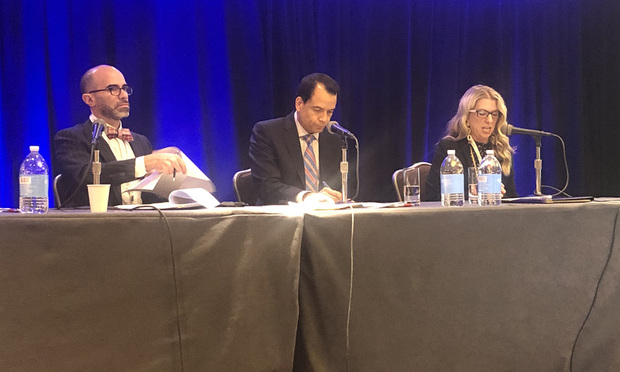Panel: Speak in Business Terms to Get Leaders to Buy In to Diversity & Inclusion Efforts
One of the best ways to get the C-suite to sign on to diversity and inclusion initiatives is to show how they can be beneficial for business, a panel at Corporate Counsel's 2019 General Counsel Conference in New York said Thursday.
September 26, 2019 at 07:01 PM
3 minute read
 Pictured, from left, are Carlos Davila-Caballero, director of diversity and inclusion at Simpson Thatcher & Bartlett; Eduardo Santiago-Acevedo, vice president and senior regulatory counsel at Prudential Financial; and Heather Nevitt, editor-in-chief at Corporate Counsel.
Pictured, from left, are Carlos Davila-Caballero, director of diversity and inclusion at Simpson Thatcher & Bartlett; Eduardo Santiago-Acevedo, vice president and senior regulatory counsel at Prudential Financial; and Heather Nevitt, editor-in-chief at Corporate Counsel.
One of the best ways to get the C-suite to sign on to diversity and inclusion initiatives is to show how they can be beneficial for business, a panel at Corporate Counsel's 2019 General Counsel Conference in New York said Thursday.
Eduardo Santiago-Acevedo, senior regulatory counsel at Prudential Financial Inc., said showing the C-suite the numbers for potential growth with diverse attorneys can motivate leaders to invest in hiring those attorneys. He said law firms do not look good in front of clients with a team of white male attorneys, and neither do business executives when boasting a non-diverse legal department.
"One of the things I've seen is CEOs and boards are getting more and more questions [about diversity and inclusion]," Santiago-Acevedo said. "It's a winning proposition to show that you're doing all you can."
Carlos Davila-Caballero, director of diversity and inclusion at Simpson Thacher & Bartlett in New York, said besides showing numbers and the prospect for growth, he has found qualitative data has also been useful in discussing the benefits of having a diverse staff of attorneys.
"Having people on the ground is the first step," Davila-Caballero said. "The general counsel will begin to see the difference."
Prudential helps promote diverse law firm attorneys through a spotlight program, Santiago-Acevedo said. He explained Prudential's firms select up to two attorneys whom they help to develop and the legal department makes sure to give those attorneys work they may not otherwise get.
"We want the people in the room to create value and be engaged," Santiago-Acevedo said.
Davila-Caballero said when legal departments overlook diverse candidates or fail to find ways to include them on matters they are losing out on talent.
"There is talent out there. Forty percent of summer classes identify as a part of an underrepresented group," Davila-Caballero said. "You're bleeding talent."
One of the challenges to experimenting with different ways to attract and retain diverse attorneys, Davila-Caballero said, is the legal industry's risk-averse nature.
"You live in a world that lives in precedent," Davila-Caballero said.
This content has been archived. It is available through our partners, LexisNexis® and Bloomberg Law.
To view this content, please continue to their sites.
Not a Lexis Subscriber?
Subscribe Now
Not a Bloomberg Law Subscriber?
Subscribe Now
NOT FOR REPRINT
© 2025 ALM Global, LLC, All Rights Reserved. Request academic re-use from www.copyright.com. All other uses, submit a request to [email protected]. For more information visit Asset & Logo Licensing.
You Might Like
View All
NBA Players Association Finds Its New GC in Warriors Front Office



Trending Stories
- 1Coral Gables Attorney Busted for Stalking Lawyer
- 2Trump's DOJ Delays Releasing Jan. 6 FBI Agents List Under Consent Order
- 3Securities Report Says That 2024 Settlements Passed a Total of $5.2B
- 4'Intrusive' Parental Supervision Orders Are Illegal, NY Appeals Court Says
- 5Federal Laws Also Preempt State's Swipe Fee Law on Out-of-State Banks, Judge Rules
Who Got The Work
J. Brugh Lower of Gibbons has entered an appearance for industrial equipment supplier Devco Corporation in a pending trademark infringement lawsuit. The suit, accusing the defendant of selling knock-off Graco products, was filed Dec. 18 in New Jersey District Court by Rivkin Radler on behalf of Graco Inc. and Graco Minnesota. The case, assigned to U.S. District Judge Zahid N. Quraishi, is 3:24-cv-11294, Graco Inc. et al v. Devco Corporation.
Who Got The Work
Rebecca Maller-Stein and Kent A. Yalowitz of Arnold & Porter Kaye Scholer have entered their appearances for Hanaco Venture Capital and its executives, Lior Prosor and David Frankel, in a pending securities lawsuit. The action, filed on Dec. 24 in New York Southern District Court by Zell, Aron & Co. on behalf of Goldeneye Advisors, accuses the defendants of negligently and fraudulently managing the plaintiff's $1 million investment. The case, assigned to U.S. District Judge Vernon S. Broderick, is 1:24-cv-09918, Goldeneye Advisors, LLC v. Hanaco Venture Capital, Ltd. et al.
Who Got The Work
Attorneys from A&O Shearman has stepped in as defense counsel for Toronto-Dominion Bank and other defendants in a pending securities class action. The suit, filed Dec. 11 in New York Southern District Court by Bleichmar Fonti & Auld, accuses the defendants of concealing the bank's 'pervasive' deficiencies in regards to its compliance with the Bank Secrecy Act and the quality of its anti-money laundering controls. The case, assigned to U.S. District Judge Arun Subramanian, is 1:24-cv-09445, Gonzalez v. The Toronto-Dominion Bank et al.
Who Got The Work
Crown Castle International, a Pennsylvania company providing shared communications infrastructure, has turned to Luke D. Wolf of Gordon Rees Scully Mansukhani to fend off a pending breach-of-contract lawsuit. The court action, filed Nov. 25 in Michigan Eastern District Court by Hooper Hathaway PC on behalf of The Town Residences LLC, accuses Crown Castle of failing to transfer approximately $30,000 in utility payments from T-Mobile in breach of a roof-top lease and assignment agreement. The case, assigned to U.S. District Judge Susan K. Declercq, is 2:24-cv-13131, The Town Residences LLC v. T-Mobile US, Inc. et al.
Who Got The Work
Wilfred P. Coronato and Daniel M. Schwartz of McCarter & English have stepped in as defense counsel to Electrolux Home Products Inc. in a pending product liability lawsuit. The court action, filed Nov. 26 in New York Eastern District Court by Poulos Lopiccolo PC and Nagel Rice LLP on behalf of David Stern, alleges that the defendant's refrigerators’ drawers and shelving repeatedly break and fall apart within months after purchase. The case, assigned to U.S. District Judge Joan M. Azrack, is 2:24-cv-08204, Stern v. Electrolux Home Products, Inc.
Featured Firms
Law Offices of Gary Martin Hays & Associates, P.C.
(470) 294-1674
Law Offices of Mark E. Salomone
(857) 444-6468
Smith & Hassler
(713) 739-1250






